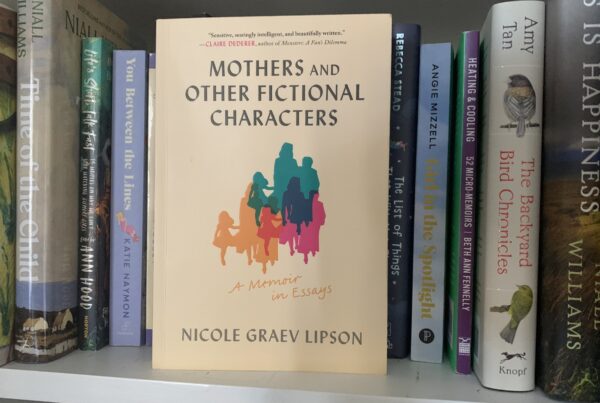Amanda Peters’ novel, The Berry Pickers, reminds us that while the shock of a particular loss may fade, grief’s residue lingers. It is neither eclipsed nor diminished by other emotions. While it can be penetrated by love or joy, it’s relentless, enduring. This is a story of characters losing one another, losing their pasts and their identities, losing family members and family, losing home.
Siblings Joe and Norma narrate the story in alternating chapters, and by the end of the first two chapters, we understand a great deal about the events that propel the story. Our work, then, is figuring out how a series of hints and shadows ultimately connect. That they do in a way that feels predictable though satisfying does not diminish Peters’ deft descriptions of the landscapes her characters inhabit. She knows Maine in summer and Nova Scotia and the night sky and grasslands and the Pacific Northwest—she knows small towns and prejudice and logging camps and isolated cabins. She revels in placing her characters in the natural world, in settings that reinforce the idea that time cannot be stopped any more than the seasons can be halted.
Norma and Joe’s family are members of the Mi’kmaq tribe, a people whose home is in Nova Scotia, but who travel to Maine each summer to harvest blueberries–hard work for which they are paid little. When I pick up a carton of perfect blueberries in a plastic container in the supermarket, it is hard to reconcile their lusciousness with the reality that harvesting them is backbreaking, unforgiving, human work. Today’s mass production is different from the labor of decades ago described in this book or from my own memories of hanging a plastic bucket around my neck with a long piece of twine and setting off leisurely to gather berries around the edge of the lake where we spent summers. It’s clear that the Native workers are ill-used and disrespected by the landowner, Mr. Ellis, and the other workers. Bias and prejudice are daily obstacles for these characters. Norma and Joe’s mother’s attempt to make a home each summer from a dilapidated cabin symbolizes the quest for belonging so many Native people and immigrants have attempted in this country. Their father pretends to be ill-educated when he takes wealthy white men to hunt, explaining to his son that the tips are better when he amplifies stereotypical Native American elements as a guide.
All the characters in The Berry Pickers live with deep grief, and we note how individuals manage–or do not manage–bone-crushing sorrow. Joe turns to violence and alcohol. Norma cuts herself off from knowing what she knows, haunted by dreams she does not understand. Those dreams–dismissed swiftly by her adoptive parents–are, in fact, memories, but no one will admit the truth of her family to Norma. She is left puzzled and tormented, and as a child, chafes against her adoptive mother’s smothering control: “much to my mother’s displeasure, I turned to books to keep me company. I think she would have preferred I stay a child forever, but I thrived on fantasies of witches and white rabbits, of submarines and musketeers. I stayed awake until the sun started to break through the blinds, lost in those other worlds, so vivid and so removed from my own…My house, with its dark wood panelling, lack of color and perpetual quiet, was a desert for the imagination. Yet, thanks to books, mine thrived.” What reader does not recognize those imaginary worlds?
Norma and Joe’s father, a realist, never speaks of grief, determined to continue to provide for his shrinking family. Their older sister, Mae, parties hard, mouths off as a way to manage. Norma and Joe’s shared mother emerges as one of the most interesting characters (though I would have liked to have known her better) because she embodies hope: she does not try to make her grief smaller; she holds hope and sorrow in equal measure, combined with deep faith and abiding love–she is a physical representation of the Bible passage from First Corinithians: “And now abideth faith, hope, charity, these three; but the greatest of these is charity.” In modern translations, the word “love” is often substituted for charity.
Her rich imaginative life fueled by stories leads Norma to a career as a teacher. Joe, full of fury, flees his family, encountering two other Native strangers, who prompt him to reflect on his identity. For him, the disappearance of his little sister, when he, himself, was also a child, is an albatross he must forever carry: it is the defining event of his life. Peters’ draws a detailed portrait of Joe and Norma’s childhoods, but both characters seem to age quickly; in the final chapters of the book, I was struck by how old they both were, how many decades had passed in quick sketches. Joe meets a Native woman in the grasslands; she becomes a touchstone for him, but though she offers him a form of atonement and inspires him to paint with bright colors the ramshackle cottage on the site of his childhood blueberry fields, she cannot help him return home. Norma marries, but the devastating loss of a baby plunges her into despair and makes her realize that she would damage a child with her own version of her adoptive mother’s grief. She leaves her husband, and the decades that pass before the novel’s final chapters are colorless and lonely.
Holding onto that which we lose or is taken from us is a familiar theme in fiction. Here, loss piles onto loss, and the losses are physical, psychological, economic. At one point, I said aloud, “Enough! How much can one man bear?” It is Joe’s fate to suffer, to be wounded–literally and figuratively–over and over–until by the time he returns home to die, he is broken beyond healing.
When I finished the novel, I felt profoundly sad for every character. Though Peters offers a resolution of a sort, I was left with heaviness. Grief and memory and identity are tangled in this novel. Who are we when we lose someone we love? Or everyone we love? Who are we when we do not belong to a place? Joe crossed the country running from his demons, refusing to return to his family because of a shame too great to conquer. Who are we when we do not know who we are–our heritage? Our identity? These are the questions Peters invites us to consider. The lovely cover of the novel hints at sweetness, but within the pages, I found only sorrow.




